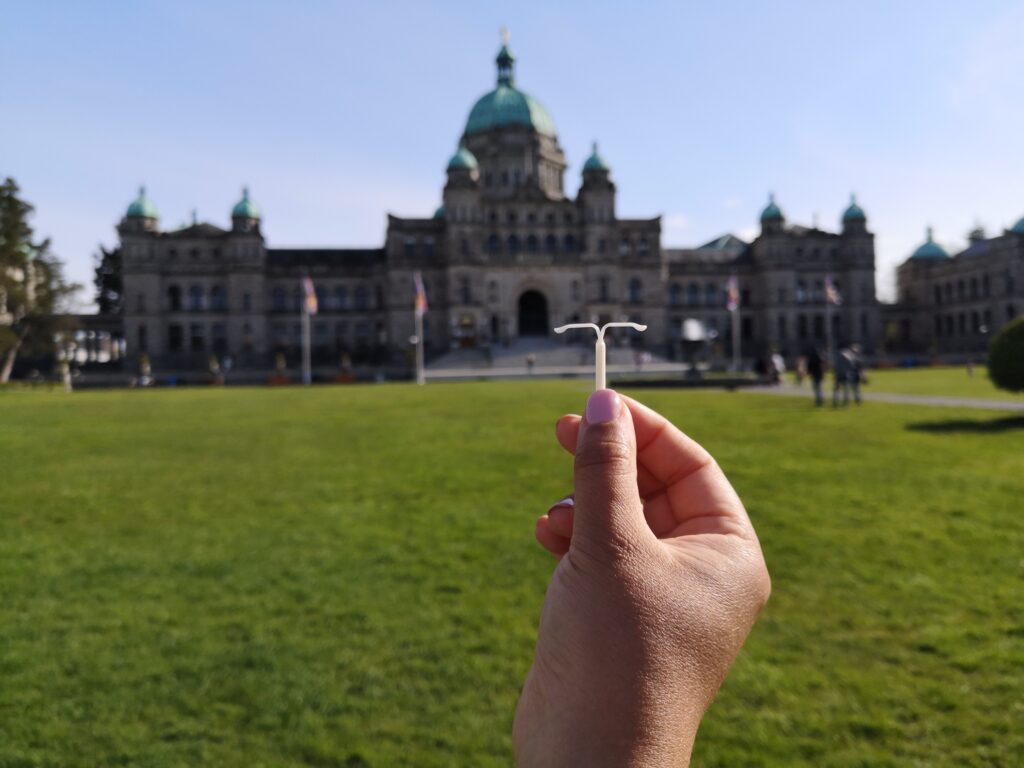When AccessBC began their advocacy work pushing BC to become the first Canadian jurisdiction to provide free contraception, they thought it would be a quick campaign.
It didn’t go as planned.
That was back in 2017, when a board game night among friends became a conversation bashing the patriarchy and discussing barriers to accessing birth control. The result of that night was a real grassroots movement—one that gained near-instant support with the BC NDP party, which then appeared in their election policy book that same year.
“The really cool thing about this campaign is that we started as just three or four people at a kitchen table and a Twitter account,” says AccessBC co-founder and Saanich district counselor Teale Phelps Bondaroff, who was seized by the contraception issue after his partner struggled to afford a contraceptive implant upon the couple’s return to Canada from the UK, where she had access to free contraceptives.
The policy to provide universal contraception coverage seemed to be a no-brainer for the government, given its health equity and economic benefits.
Across Canada, contraception comes with a serious price tag, as high as $550 for an intrauterine device (IUD), $350 for an implant, $240 for a year of oral contraceptive pills or $180 a year for hormone injections.
These costs fall disproportionately on people with uteruses—one in five of whom will experience an unplanned pregnancy—and especially on youth and people with low incomes who are more likely to use cheaper yet more precarious birth control methods such as condoms, or no contraception at all.
With free birth control comes reproductive autonomy and savings. Someone who spends $25 a month on the pill could save up to $10,000 in their lifetime. Plus, universal contraception is net revenue positive, making it an economic win for the government, too.
In 2010, Options for Sexual Health released a study estimating that every $1 spent on contraceptive support for women could save as much as $90 in public expenditure on social supports. In other words, the BC Government could save as much as $95 million per year by implementing a no-cost contraception policy.
So, when John Horgan’s NDP party won the BC election in 2017, AccessBC thought it would be a short matter of months before universal contraception became a reality.
They were wrong.
Despite the government’s commitment to the policy, the Health Ministry wanted to see more public support before implementing it, Phelps Bondaroff says. The unexpected roadblock propelled AccessBC into advocacy and activism, kickstarting letter-writing campaigns and seeking municipal endorsements from cities across BC.
Around 80 B.C.-wide volunteers led the charge, including activists and medical professionals, including Dr. Ruth Habte, an Obstetrics and Gynaecology resident at the University of British Columbia, former pharmacist and AccessBC’s campaign organizer.
Like many, Dr. Habte was optimistic yet frustrated by the government’s delays.
“As someone who practices medicine, I saw the downstream effects of not having the policy again and again. I saw how people who weren’t able to access the contraception of their choice were more likely to have an abortion, or experience a disruption to their life as a result of unplanned pregnancy,” she says. “All of those things could have been prevented if people had access to the contraceptive option of their choice.”
As six years passed, public support grew. The campaign’s call for no-cost contraception was backed by 36 B.C. municipalities and a wide range of health researchers, unions and civil society organizations. Pressure on the provincial government mounted.
“I described our campaign as that meme of Judge Judy tapping her watch impatiently for like three years,” says Phelps Bondaroff.
“It was a rollercoaster. For every single provincial budget, we would write three press releases: a frowny-face, straight-face and smiley press release. We had to use the frowny one far too many times.”
But finally, AccessBC’s smiley-face press release finally got its moment in the spotlight this past February when the B.C. government announced its long-awaited $119 million commitment to free contraception in the 2023 provincial budget.

As of April 1, the province is offering free contraceptives including most oral pills, injections, copper and hormonal IUDs, implants and Plan B (also known as the morning after pill)—the first Canadian province or territory to do so.
“The impact of the policy cannot be overstated,” says Dr. Habte. “We know that it will help so many people, like young folks who are on their parents’ insurance and don’t want their privacy violated. We know that it’ll help for gender-affirming care. We know it helps with pelvic pain, heavy menstrual bleeding and things that keep people from working and living healthy lives.”
Though some forms of contraception like vaginal rings and transdermal patches—and, notably, forms of contraception for men or folks with testes—are not included, Phelps Bondaroff says the BC Ministry of Health is open to expanding the policy to include them in future.
And, as part of an effort to reduce barriers to accessing prescriptions, pharmacists will also be able to prescribe and provide contraception over the counter later this year. While this will help ease the administrative burden faced by people with uteruses when accessing birth control, it will still pose an issue for those without identification or who experience pervasive discrimination navigating healthcare, such as newcomers or people in precarious jobs like sex work.
Though imperfect, the move still marks a massive win for health equity and stands as a testament to the power of a people-driven movement. For AccessBC, it’s bittersweet.
“We have this amazing team of trained and ready-to-go feminists. If we had won three years ago, we could have been focusing on abortion access in remote communities. We could have been working on menstrual products,” says Phelps Bondaroff. “We’ve been chipping away at one root of the patriarchy for the past six years, but the roots run deep, and it would have been great to chip away at another root. But now we can.”
As Canada’s “older sister campaign,” AccessBC is turning its attention to helping similar grassroots movements across Canada, many of which are receiving increased attention as provincial and territorial governments face pressure to follow in B.C.’s footsteps.
“Those campaigns need a lot of work. It’s an uphill battle in Alberta and in Ontario, for example, so our hope is throwing as much support behind them as possible,” says Phelps Bondaroff.
The group has also talked about creating an “old-school abortion caravan” but for now, Phelps Bondaroff says AccessBC’s priority is much-deserved celebration and rest.
“We’re like, you know what, right now we need some time off. We’ll look into the Winnebago later.”




